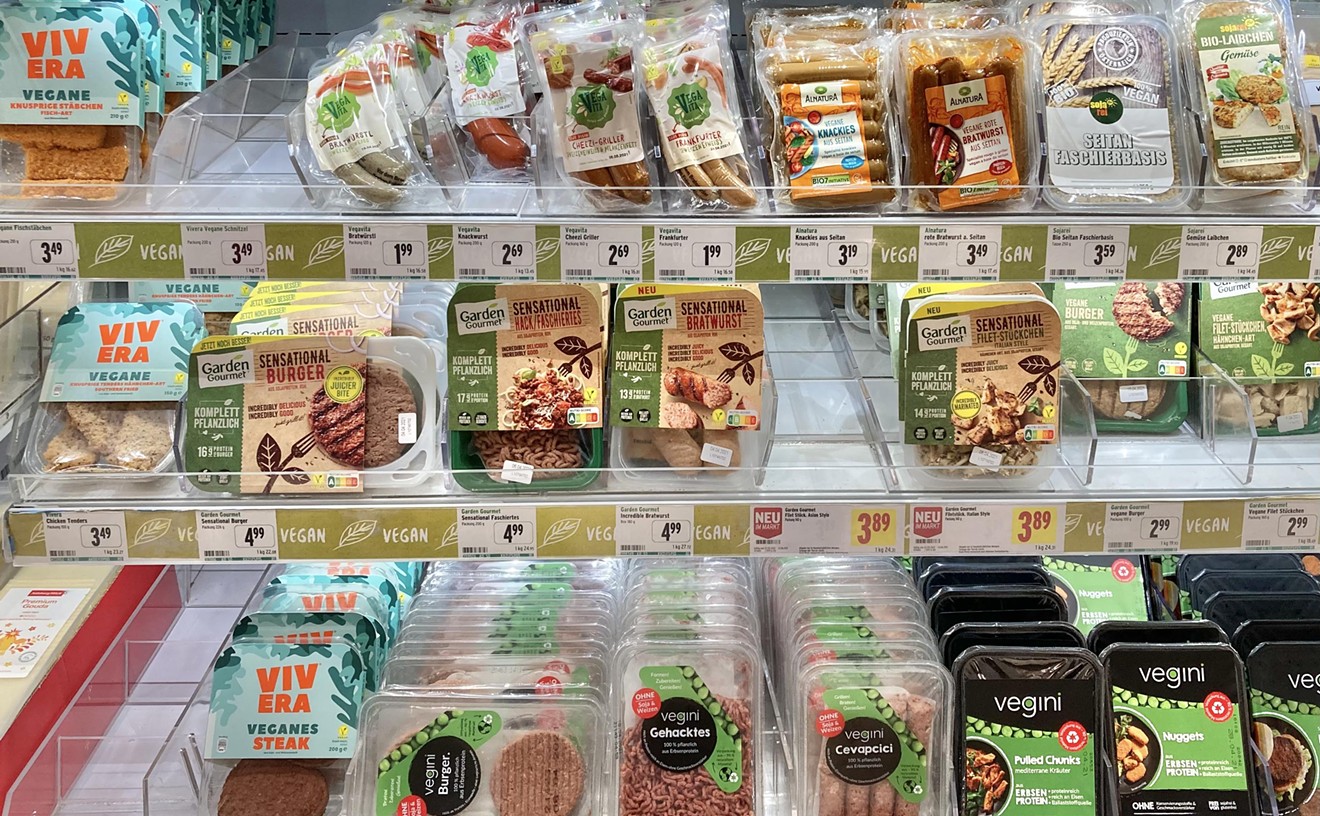For Hawaiians, taro is more than an edible plant. It's an ancestor to all Hawaiian people.
According to legend, the taro plant is the elder brother of mankind. Watered by the tears of goddess of Ho'ohokukalani, the plant nourished the people, and, in turn, the people cared for the taro. It only make sense that taro, or kalo in Hawaiian, is an essential ingredient in the islands' cuisine.
The plant's leaves, called lu'au, are the key ingredient in laulau, a traditional dish that features chunks of meat (usually pork) wrapped in the leaves and steamed. Done right, the result blends fatty, salty, and rich meaty flavors together in simple but perfect balance. And for those who love Hawaiian food, well-prepared laulau is the most satisfying kind of soul food, the type of dish that can connect a diner not only to a personal memory, but also to a deep cultural history.
See also: Hodori in Mesa Offers Korean Eats for Adventurous Diners
Aloha Kitchen in Mesa serves laulau just once a week, on Saturday mornings. Stop by during the middle of the lunch rush and you'll find tables of diners peeling open foil packets of gently steamed pork wrapped in tender greens. Traditionally, the bundle doesn't come wrapped in tinfoil, as it is here, but this dish is the real deal in every other way: Peel back the silver shell and you find deep green taro leaves draped around salted pork. The thick hunks of fork-tender meat offer a hint of tea flavor imparted from the lu'au, as well as a pleasant, delicate saltiness.
If you want a plate, you'd better get there early. By 3 o'clock, the laulau special will be gone, and latecomers will have no choice but to wait until the next week.
When it comes to Hawaiian food in metro Phoenix, there are a dozen or so places in town that can satisfy your basic cravings for a plate lunch. The number dwindles when it comes to traditional Hawaiian eats done well, and among the best of the limited bunch is Aloha Kitchen.
If time can be considered a measure of a restaurant's success, then at 28 years old, Aloha Kitchen is a hit. Located in a strip mall in southwest Mesa, the restaurant isn't sleek or particularly modern. The sky blue paint on the walls looks fresh, at least, and an island-themed mural and assorted tropical paintings give the space a playful, relaxed atmosphere.
In addition to offering hard-to-find dishes, the brightly decorated spot serves some of the most affordable food in town. On any given day, you can order a generous plate of meat and rice for under $10.
In terms of modern Hawaiian food, the plate lunch is as quintessential a dish as they come. Aloha Kitchen's selection of Aloha Plates isn't all that extensive, but it covers the Pan-Asian basics. Each plate comes with rice and either potato and macaroni salad or greens. Potato-mac makes a more conventional choice for plate lunch; it's also infinitely better than the option of iceberg lettuce covered in too-sweet Thousand Island dressing.
But even though Aloha Kitchen's plate lunch is both enjoyable and affordable, it's the Wednesday and Saturday specials that make this spot particularly worthwhile.
On Wednesdays, the daily special is the Hawaiian Plate, a spread that covers the basics of old school island eats. For under $10, diners get kalua pig, lomi salmon, chicken long rice, and white rice. Be warned: Wednesday's special plate probably will be sold out by dinnertime.
The kalua pig, traditionally slow-roasted in an underground oven called an imu, isn't prepared the ancient way here. The subtle smokiness comes instead from Liquid Smoke. Even so, it's a heaping pile of moist, shredded pork; the only thing missing was a touch more salt.
When it comes to kalua pork, the inclusion of cabbage can be a point of contention, and Aloha Kitchen prepares its pork with the greens scattered on top. At least that makes it easy enough to avoid them if you wish, though the mild flavor makes the cabbage inoffensive.
To break up the inherent dryness of roasted pork, you'll want to crack open the container of lomi salmon. Lomi, meaning, "to massage," refers to the salt-curing preparation traditionally used for the dish. With diced tomatoes and both white and green onions, the side dish balances sweet and sharp flavors quite well. The scant number of pieces of salmon scattered throughout was a disappointment, but the mixture is still enjoyable with a bite of pork or over white rice.
Chicken long rice, a popular luau dish, may remind first-time diners of chicken noodle soup. It's not really a soup, per se, but rather a brothy dish that features pieces of chicken with thread or bean noodles. Aloha Kitchen's version leans heavily on ginger for flavor, giving the noodles and chicken a pleasant piquancy.
In addition to the laulau plate Saturday special, other weekend offerings can include Hawaiian favorites such as Spam musubi. The popular snack and lunch for locals on the go can be found just about everywhere -- including gas stations and convenience stores -- but sadly, Aloha Kitchen's version isn't the best example. Too-thin slices of Spam over a block of white rice and wrapped in seaweed wanted something (oyster sauce, maybe?) to counteract the dryness. At least it's a way to get your salty canned meat fix.
If there's poke (pronounced "poe-kay"), grab an order. Made with raw ahi tuna marinated in soy saucee and sesame oil, this side dish is a staple for Hawaiians. Aloha Kitchen's version nails it: Loaded with white and green onions and hearty chunks of fish, it's a savory mouthful that's fresh and flavorful.
Loco Moco also may appear. The unconventional breakfast dish features a burger patty topped with a fried egg and smothered in gravy. At Aloha Kitchen, even the disappointment of having an overcooked yolk can't spoil the pleasure of rich gravy over a beef patty and rice.
It's worth mentioning the restaurant also serves saimin everyday. The uniquely Hawaiian creation is so ubiquitous in the islands that you can get a bowl at McDonald's restaurants throughout the state. It blends the noodle soup traditions of Chinese, Japanese, and Filipino foods, which collided thanks to the immigrants who came to the islands during the sugar cane plantation era.
Aloha Kitchen provides a first-rate bowl made with light, nearly clear shrimp-based broth and egg noodles that give just the right amount of bite. But the best way to enjoy Hawaiian noodles will be with an order of the restaurant's fried saimin. Drier than Chinese chow mein, these stir-fried noodles combine kamaboko, char shiu, cabbage, and green onion. The light char on both the noodles and fish cakes gives the mixture instant appeal.
For those dreaming of Honolulu's Rainbow Drive-In or Ono Hawaiian Foods, Aloha Kitchen will leave you feeling there's something missing. For one, there's no poi, the mashed taro root dish that was a staple for ancient islanders. A server said they used to offer the dish until importing it became too costly.
Even today in Hawaii you'd hardly imagine eating a traditional meal with the stuff, but the lack of poi isn't enough to discredit this place as haven for Hawaiian food lovers. In offering a soul satisfying taste of Hawaiian tradition, Aloha Kitchen does the important things right.
Aloha Kitchen 2950 South Alma School Road, Mesa 480-897-2451 www.alohakitchen.com
Hours: 11 a.m. to 8 p.m. Tuesday through Saturday 11 a.m. to 5 p.m. Sunday
Laulau plate $9.50 Hawaiian plate $9.50 Fried saimin $7.95










